Hello blurters! Now i will discuss about Speech of March 7, 1971 A historic speech given by Sheikh Mujibur Rahman at a public meeting held on March 7, 1971 at Racecourse Maidan (now Suhrawardy Udyan) in Ramna, Dhaka. He started the speech at 2:45 pm and ended it at 3:03 pm. The speech lasted 16 minutes. He is the founder of Bangladesh. Before the fight with Pakistan shaikh mujibur rahman delivered his speech to peoples of Bangladesh. now i discuss about the speech .
In this speech he called upon the Bengali's of the then East Pakistan (now Bangladesh) to be ready for the freedom struggle. A written commentary on this speech was soon distributed. It was somewhat refined by Tajuddin Ahmed. The main purpose of the revision was to emphasize the need to repeal martial law and transfer power to elected representatives. The speech was translated into 13 languages.As the 13th, the speech was translated into the Kudmali language of the Mahato ethnic group, which is the 1st translation in the language of the ethnic group. Newsweek magazine recognized Father of the Nation Bangabandhu Sheikh Mujibur Rahman as a poet of politics. On October 30, 2016, UNESCO recognized this speech as a historical document.
Background:
In 1970, the Awami League won an absolute majority in the National Assembly elections in Pakistan. But Pakistan's military junta began delaying the transfer of power to the group. In fact, their purpose was to somehow keep power in the hands of West Pakistani politicians. In this situation, the President of Pakistan General Yahya Khan convened a session of the National Assembly on 3 March.But unexpectedly, on March 1, the session was adjourned indefinitely. The news sparked protests in East Pakistan. A simultaneous hartal was observed in Dhaka on March 2 and across the country on March 3 under the leadership of Awami League chief Sheikh Mujibur Rahman.He announced the program of all-out non-cooperation movement in the whole of East Bengal in a huge public meeting held at Paltan Maidan on 3rd March. It is against this background that a large number of people gathered at the Racecourse Maidan on March 7; The whole ground turned into a sea of people. Sheikh Mujibur Rahman delivered his historic speech for the benefit of the people and the nation as a whole.
Speech record:
He discusses several aspects of the speech:
- Review of the overall situation.
- Focus on the role of West Pakistani politicians.
- Demanding repeal of martial law.
- Calling the Bengalis to face oppression and military aggression.
- Deciding to continue the general strike in East Pakistan until the demand is met.
- Call for resistance to oppression and aggression and inspire Bengalis with the mantra of independence.
Speech record:
The Pakistani government did not allow the speech to be broadcast on radio or television on March 6, 1971. Despite the government's ban, the then chairman of the Pakistan International Film Corporation, AHM Salahuddin, and the managing director decided to record the speech of M Abul Khair, a Member of Parliament for five constituencies in the then Faridpur district at the same time.They were assisted in this task by Abul Khair, a film director and actor in the film department of the then government of Pakistan, who recorded the video of the speech. HN Khandaker, a technologist from the then Ministry of Information, recorded the audio of the speech with them. The audio record was developed and archived by the record label Dhaka Records owned by M Abul Khair. Later, a copy of the audio and video recording was handed over to Sheikh Mujib and a copy of the audio was sent to India. As many as 3,000 copies of the audio are distributed worldwide by Indian record label HMV Records.
Recognition and feedback:
On October 30, 2016, UNESCO recognized the March 7th speech as a "Documentary Heritage". A total of 8 important documents including this speech were recognized simultaneously. UNESCO preserves important documents from all over the world. The Memorial of the World International Register (MOW) has so far collected 428 important documents, including the March 7 speech.
In response, Prime Minister Sheikh Hasina compared it to "revenge of history". Because in independent countries this speech was banned for a long time. Shabiprabir teacher Zafar Iqbal said in response, Not Bangabandhu but UNESCO has been honored with recognition of this speech. Because now they have the greatest speech in the world, they can say. Commerce Minister Tofail Ahmed said in response to the Secretariat,
"Sheikh Mujibur Rahman delivered the speech very cautiously. On the one hand he declared independence and on the other hand he was careful not to be branded as a separatist. He did not take responsibility for breaking up Pakistan. Although he prepared to attack the public meeting, he could not do so.
An intelligence report by the Pakistan Army also described Sheikh Mujib as "smart". An intelligence official said in the report that-
"Sheikh Mujib strategically declared independence, but we could not do anything.”
Dhaka University Professor Syed Anwar Hossain told Deutsche Welle:
"In 2015, a Canadian professor published a book on historical speeches from around the world. Bangabandhu's speech was also there. At that time it got academic recognition but this time it got international recognition."
Translation:
The Bangladesh Embassy in Japan translated Sheikh Mujibur Rahman's March 7 speech in June 2019 into Japanese. Although the speech was previously translated into English, it was first translated into Japanese as a foreign language.The historic March 7th speech is attached to a recently published book in Kummali called 'Kathuenen: Mahato Dictionary'. It was translated into Kurmali by Ujjal Mahato, a writer and researcher of Kurmali language.
Good speech:
President Yahya had a lengthy telephone conversation with Mujib on March 7 and tried to persuade him not to take any action that would block his return. He later sent a message to the teleprinter for Mujib. In my presence at midnight this message reached the Martial Law Headquarters in Dhaka. I hurriedly read it before sending it. A brigadier himself went to Dhanmondi's residence and delivered the message to Mujib.
On the same day (March 7), President Yahya announced that a meeting of the National Assembly would be held in Dhaka on March 25. If this decision had been taken a week earlier, the situation would have been different.
The next day (March 7), the United States Ambassador to Pakistan. Farland met with Mujib. After a while a Bengali journalist, named Mr. Rahman told me on the telephone that the issue of unilateral declaration of independence had been removed.
That extreme juncture came. Mujib was scheduled to deliver his speech at 2.30 pm (local time). He ascended the stage amidst the tension of the coil. He looked at the huge crowd waiting for an announcement. Mujib started with his usual thunderous voice. But slowly the voice came down to the low village to adapt to the content of the speech. He did not declare unilateral independence. But he imposed four preconditions on attending the March 25 session of the National Assembly.
Towards the end of his speech, he advised the people to remain calm and non-violent. The crowd that broke through the racecourse with a wave of emotion — like a tidal wave ঘরে returned home. In a telephone conversation from headquarters, a senior military official said the chief martial law administrator had said "this is the best speech in this situation."
After the storm subsided, Lieutenant General Tikka Khan arrived in Dhaka at 3.40 pm. He was received by Lieutenant General Yakub, Major General Khadim Raja and other high-ranking military officers. I was there too.
In the evening of the same day, General Tikka was officially informed of the situation. During the briefing I was asked to stay in the adjoining room so that I could be found. But no one came to call me. At 7:30, General Yakub left the room after the briefing. And he put his loving hand on my shoulder and said: ‘Nahi khel aaye daag baruche khudo ke ati he aur don jaba ante ante.’ (At first glance no one can fully understand the significance of the problem.
What Bangabandhu will say on March 7, there was anxiety everywhere, asked. National Assembly session adjourned, soldiers firing on processions, killing people. The situation has gone to such a place, there is no way back. We, the teachers and students of the art college have been associated with the freedom movement in various ways since the sixties. We were activists of the Parliament of Culture. I was directly involved in the mass movement of '79. Now artists, writers and teachers have merged directly with all the people of the country.We bring out the procession, on the front of which was written the demand of the people of Bangladesh - not freedom, but freedom. The word swa-dhi-na-ta was written in four kula. And the racecourse ground is in front of our art college.
We drew a lot of cartoons, I was a young cartoonist then, I am drawing a lot of cartoons, those cartoons were also in the hands of our procession, at the end of the procession they were hung in the art college. On March 7, we saw people coming from college in the morning. Procession after procession. People are coming with sticks. The procession is coming with logs from the side of the Institute of Engineers. All kinds of people from all over the place. People from all walks of life, men and women of all ages can come from as many places as possible.
I, Bulban Osman, Hashem Khan and Shahadat Chowdhury entered the sea of people on the opposite side of the library. There was a wooden fence around the racecourse grounds then. There was that hill in the children's park, a gymkhana near the hill, and a banyan tree. Couldn't get any closer to the stage. People and people. Millions of people. She is a wonderful sight. That scene is not to be forgotten. Bangabandhu did not give the speech! As Sirajuddaula escapes, his voice slowly rises, his fluctuations like Sachinbabu's voice. Slowly he created the whole atmosphere. He flooded all the people. When all the senses were anxious to hear a sentence, he declared, "This time the struggle is for our liberation, this time the struggle is for freedom."
After the speech, we went to Sharif's canteen. All the young writers-artists-cultural activists gather there. At that time there was only one topic of conversation - politics. After that speech, everything became one, who is pro-Russian, who is pro-China, who is Awami League or who is silent Muslim League — all are one. We know that there is only one destination in front of us - freedom.
There were surprises in the speech:
I had no direct connection with politics. But I was aware. I used to watch, listen and review what was happening where and when with my friends. From the beginning of March, it seemed that a disaster was approaching. At that time a representative of our company [pharmaceutical company May & Baker] came to Dhaka from Paris, France.On the morning of March 7, I was with him at the Intercontinental Hotel [later Hotel Sheraton and Ruposhi Bangla. Now I was talking Intercontinental again. I told him, after a while in that field [Racecourse ground. At present Suhrawardy Udyan] Our leader Sheikh Mujibur Rahman will give an important speech, I will go to hear that speech.
He was French. The French are usually quick to get involved in politics. Her name was Michelle Gilmore. He told me, ‘I will go with you too.’ There are also pictures. But it is difficult to describe it without seeing it with the naked eye. Thousands of people from all over are coming to the meeting with different types of banners.At the meeting, different slogans, different banners. It was as if they were approaching the battlefield. It was difficult to imagine the population at that meeting. Somewhere in the middle of the field, my foreign friend and I sat on the grass and listened to the talk.
After the speech, the friend asked me, what did he [Bangabandhu Sheikh Mujibur Rahman] say? I said in English, Declaration of War. The only thing that came out of his mouth was, ‘That is Siddhis? He could have tried for Trizon. 'Then we walked out of that meeting. I took him to the door of the hotel and walked to my house on Topkhana Road. My wife said, "What did you hear in the meeting?"
I told him the same thing. Hearing this, my wife said, what will happen next? I said, dense disaster. This catastrophe is coming soon and it is a bloody war. Then the non-cooperation movement started. There is no way to believe without seeing how a leader of the country can give so many surprises in a one day speech. I have personally seen Sheikh Mujib very closely. But I never thought that he would be able to earn the loyalty of every human being, not just their feelings.In that history of the non-cooperation movement, I would say that Sheikh Mujib, as the successor of Mahatma Gandhi, set another example in the world. We have all realized the success of that non-cooperation movement, its complete success. But we did not realize that on the one hand the non-cooperation movement was going on and on the other hand the preparations of the Pakistan Army were moving in a certain direction.
Great speech:
I sat in front of the radio set from noon on March 7 with eager interest and deep anxiety. It was said that Bangabandhu's speech at the rally at Dhaka Racecourse Maidan would be broadcast live on radio. But that did not happen. Sitting on the campus of Chittagong University, our anxiety increased.I called my teacher Munir Chowdhury on the night of March 1 and 3 to know the news of Dhaka. I called him again late at night on the 6th. As soon as the telephone rang, he picked up the tension in his voice. Yes, he went to hear the lecture at the racecourse.He gave speeches, gave descriptions of the sea of people, spoke of the reactions of the people. I clearly felt that the experience of the afternoon still fascinated him. That is my last word in life with him.
Friends from Chittagong city and Dhaka were talking on the telephone with many on campus. Bangabandhu's speech could not be broadcast immediately on the radio. However, it was learned that in protest, the Bengali officials and employees of the radio also stopped their work immediately and it was later agreed that the recorded speech of Bangabandhu would be broadcast on the radio the next morning.
The speech of March 7, so we heard it on March 7. What a wonderful speech! The whole body is thrilled. When Bangabandhu said, 'This time the struggle is for our liberation, this time the struggle is for freedom', then it seemed that a new nation was born in the heart of the world.At that time turbulent time was flowing all over the country. The wind was blowing in Dhaka, the heart of the country. Everyone knows Bangabandhu's speech on March 7 as declaration of independence. Decades later, in a speech, Maulana Bhasani said, "Mujib has declared independence, there is no disagreement about that." With that announcement, we got a new program. The Satyagraha that started on March 3 took the form of non-violent non-cooperation after March 7.
At the time of that non-cooperation, the government had no control outside the cantonment and the governor's building, everything was going on under Bangabandhu's direction. The refusal of Chief Justice BA Siddiqui to administer the oath of office to Governor Tikka Khan made headlines around the world. People from all walks of life and government employees joined them in the nationwide protests.Artists and writers organized demonstrations, processions and rallies, and boycotted government titles. The ex-servicemen, led by Colonel Osmani and Major General Majid, vowed to fight for the country. Everyone is calling for the establishment of an independent Bengali state.
The message in the unique speech was for everyone:
The first declaration of independence was made public at a public meeting of the platoon organized by Chhatra League on the afternoon of 3 March. Sheikh Mujibur Rahman was present in the public meeting. At that time he was not only the president of Awami League, he was the parliamentary leader of the majority party in the elected National Assembly, Bangabandhu, the father of the nation. Everyone looked at his face - what would he say. He said he would say whatever he had to say on March 7.March 8, Sunday. Weekly holidays. However, everything has been closed since March 1. The strike is going on. People have been gathering at the racecourse ground of Dhaka since 10 am. On that day, it was as if the tide of people descended — thousands, millions of people. There is only one slogan in their mouths - Hold the arms of brave Bengalis, make Bangladesh independent. The unprecedented mandate that Bangabandhu received in the December 7, 1970 elections made him more confident and at the same time responsible.In Pakistan at that time there were three main characters — Awami League leader Sheikh Mujibur Rahman, People's Party leader Zulfikar Ali Bhutto and President General Aga Mohammad Yahya Khan. All three of them knew that Pakistan was breaking up. But who will take the responsibility?
In response to Yahya's radio announcement on March 1, people across the country spontaneously declared independence. The Pakistani flag was burnt. The new flag of independent Bengal was hoisted. Extreme pressure was being exerted on Bangabandhu to declare independence unilaterally.The Pakistani ruling class has been calling Sheikh Mujib a 'separatist' for so long. There was no benefit in filing 'Agartala conspiracy case' alleging 'conspiracy' to break up Pakistan. The case had to be withdrawn due to strong mass movement. The ruling party was waiting for the opportunity, for a credible source to accuse Sheikh Mujib of 'separatism'.
Sheikh Mujib has had to think a lot about the demand for formal declaration of independence on the one hand and the sword on the head for separatism on the other. The conservative section of the Awami League did not want to face an uncertain future. They wanted stability. In such a situation March 7 came.
Major General Khadim Hossain Raja, then acting regional martial law administrator, described the context of the March 7 speech:
I will sit in the cantonment and listen to the speech he (Sheikh Mujib) will give at the racecourse. He has made arrangements. If he destroys the unity of the country and declares unilateral independence, I will perform my duty without any hesitation. The army will be asked to break up the meeting and, if necessary, to demolish the city of Dhaka. Sheikh should be informed that if he does not show prudence, the consequences will be fatal and the responsibility will fall on him. He should keep the door of discussion open and avoid unnecessary bloodshed.
On the night of March 7, President Yahya called Sheikh Mujib. Yahya requested not to say anything from which there would be no way back. Earlier, in a radio address, Yahya announced that the National Assembly would convene on March 25.
The March 8 racecourse rally was scheduled. During the day and night on March 7, Sheikh Mujib discussed the content of his speech with members of his party's high command. He and Tajuddin Ahmed felt that the declaration of independence was untimely.
In this context, Rehman Sobhan said, "The youth of Awami League, like Sirajul Alam Khan, known as Kapalik, were in favor of starting a full-fledged war of liberation by declaring independence now." Before going to the meeting on March 7, Nurul Islam and I went to Iqbal Hall to know their thoughts. I met Kapalik. He seemed disappointed. "There is no dramatic declaration of independence," he said.
Bangabandhu Sheikh Mujib arrived at 3 pm at the largest public meeting of the commemoration held at the racecourse on 7 March. He was the only speaker. He had a fever. There was more heat in the field than that. He knew what people wanted. It is doubtful whether any other public leader understood public psychology better than him. At the same time, he sensed that the military junta was facing an attack. Depending on his words, people will return home satisfied or there will be bloodshed. Many are sitting on the ground declaring independence.
The crowd did not chase after them. They are waiting for Bangabandhu's instructions. Here he has many responsibilities and responsibilities at the same time. He spoke in support of the US Alliance, but said that maintaining some independence was important for the United States. The conditions are:
Martial law must be lifted;
The army must retake the barracks;
The firing on unarmed crowds must be investigated;
Power must be transferred to elected representatives;
Once these four conditions are met, he will announce that he will 'consider' joining the session. He knew that accepting the first and fourth condition would be tantamount to suicide for the ruling class. But he gave a clear message that he had left the door open for negotiations. On the other hand, he told the freedom fighters, "This time the struggle is for our liberation, this time the struggle is for freedom."These two sentences he uttered twice in his 19-minute speech. He had no difficulty in realizing that a war was imminent. So like a guerrilla leader said, ‘We will kill you in rice, we will kill you in water.
This speech of Sheikh Mujib was absolutely 'Extempore'. Doubt whether he has ever given such a tidy speech before. His word choice, the tone of his voice, the language of his body — everything was fancy, unprecedented, unforgettable.
Bangabandhu Sheikh Mujibur Rahman's speech on March 7 was a call to awaken a people. At the same time it was the last weapon of bargaining with the ruling class. One last attempt at a peaceful settlement. This discourse of multidimensional connotations is and will continue to be dissected in various ways. The speech must be judged in its overall sense. He cannot be understood in one or two sentences in isolation.
Politicians and intellectuals of this country have interpreted the March speech in various ways. The question is, how did the person who gave this speech evaluate it? In his inaugural address to the council meeting of the Awami League on January 17, 1974, he said, "The history of independence has never been a lie. All my colleagues who were here knew what would happen on the night of the 25th.I told them, I live and die, keep fighting. The people of Bengal must be liberated. What was left to talk about the freedom struggle on March 7? In fact, independence was declared on March 7. On that day it was clearly said - this time the struggle is for our liberation, this time the struggle is for freedom. '
I will do my best to read and respond to each comment!
@megadrive
@mmmmkkkk311
@saboin
@blurtmob
@adsactly
@article
@betterlife
Thanks a lot everyone.
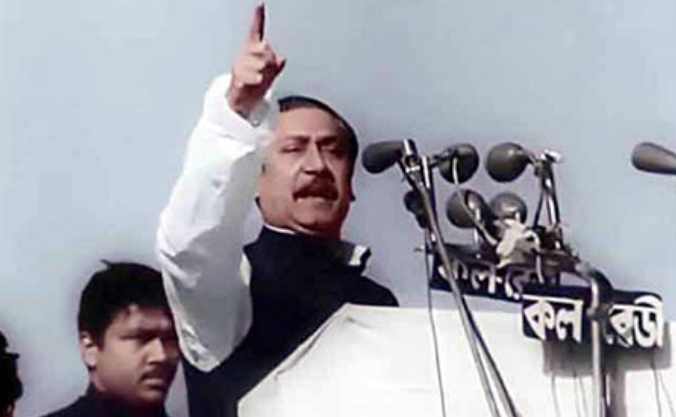
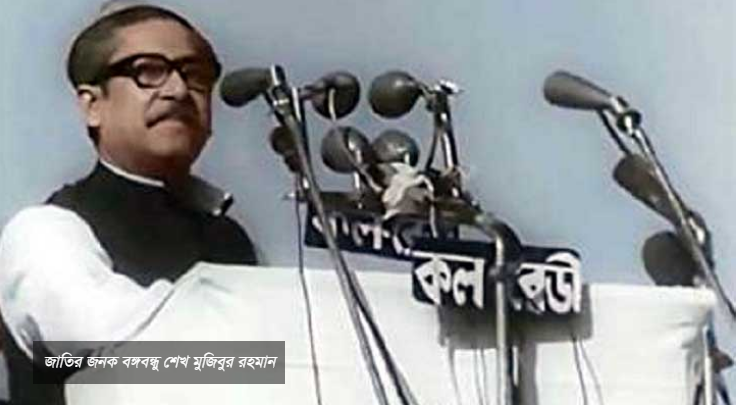
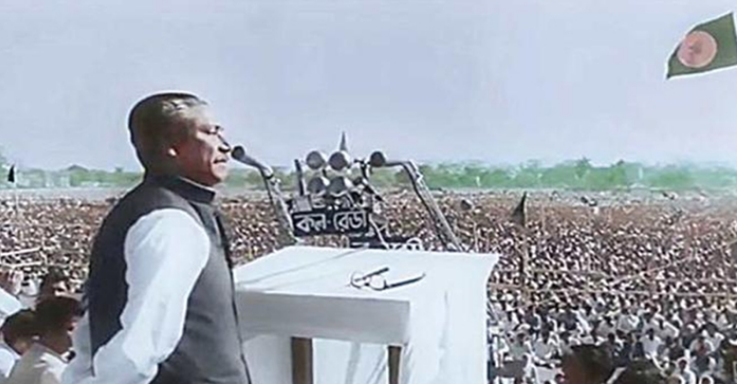
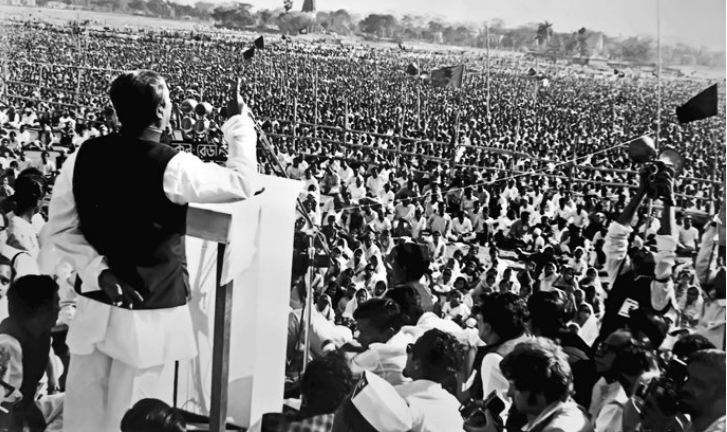
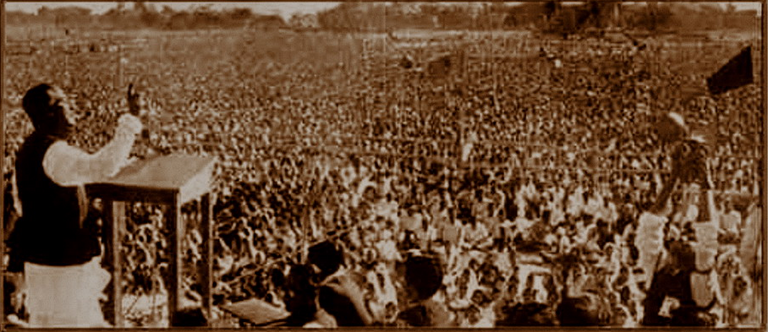
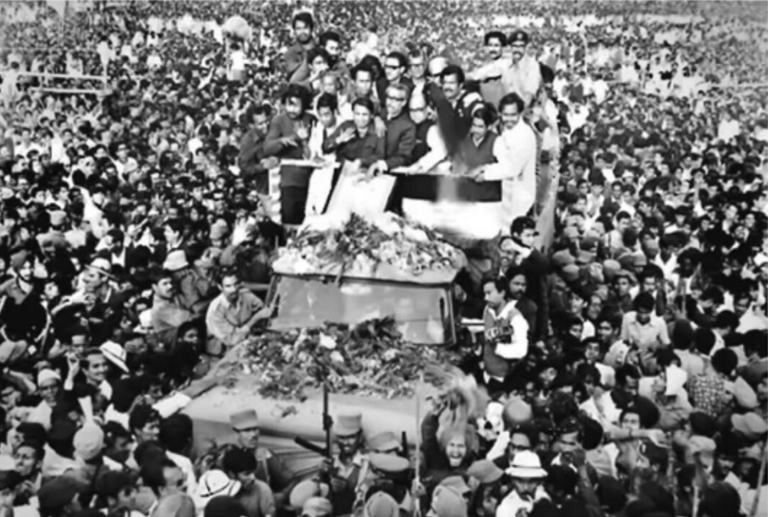
** Your post has been upvoted (0.93 %) **
Curation Trail Registration is Open!
Curation Trail Here
Delegate more BP for better Upvote + Daily BLURT 😉
Delegate BP Here
Thank you 🙂 @tomoyan
https://blurtblock.herokuapp.com/blurt/upvote